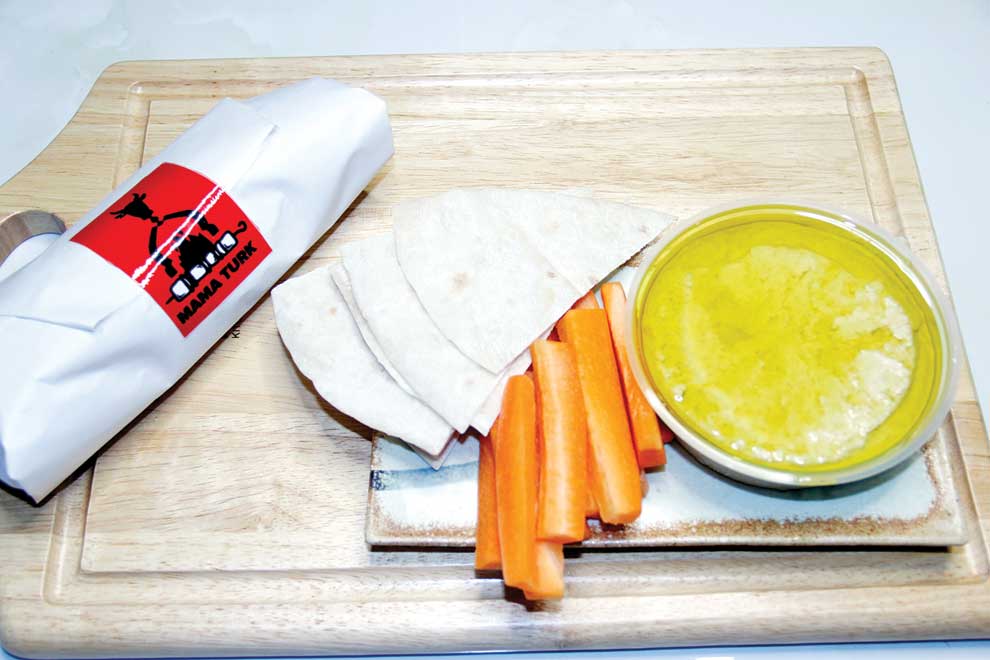
Mama Turk founder and chef Merve Alaz Vardarli was trained at Istanbul’s famed MSA Culinary Arts Academy. Post Staff
Mama Turk is bringing Phnom Penh the authentic tastes of Turkey with their delivery-only business offering mouthwatering beef and chicken wraps, and shish kebabs, as well as hummus and Mediterranean salads, while also catering for vegetarians.
“We decided to set up Mama Turk due to the strong demand we found in Phnom Penh for authentic Turkish kebabs and cuisine. There are many restaurants in the city that serve kebabs, but I was unable to find the true taste of Turkish cuisine that I remember so fondly.
“Food is such an important part of Turkish culture that you cannot say the food is truly Turkish without true passion and love for food. A lot of effort and love is put into each of our beef kebabs, and we hope our customers enjoy our homemade Turkish cuisine and order more,” Mama Turk founder and chef Merve Alaz Vardarli told The Post.

Mama Turk’s kebabs, bread and hummus are all homemade. Post Staff
The Istanbul native said that while the name “Mama Turk” was chosen to reflect the real home-cooked nature of the food, it also has a stronger significance.
“It is a universal language when one says ‘This food reminds me of home’. In Turkey another statement has a deeper meaning – ‘This food tastes like my mama’s’. Turkish cuisine comes from the heart of the house, and this heart resides with the mothers.
“I wanted to give tribute to every mum and grandmother, and all the women who have fed us and shared their recipes. As a Turkish woman myself, I wanted to show my appreciation to every hard-working Turkish woman by giving my business this simple, feminine name,” Vardarli said.
This honouring of women’s role in cooking is even reflected in the sourcing of Mama Turk’s ingredients.
“We only use the freshest and best quality produce we can find, bought only from female vendors. Our locally sourced vegetables are purchased at the Doeurm Kor night market. It is the largest vegetable market in Cambodia, with fresh produce from across the provinces.
“Our meat and dairy is sourced from Australia, New Zealand, the US and India. All the cuts of meat we get are among the best quality you can find in the city,” Vardarli said.
Having been professionally trained at Istanbul’s famed MSA Culinary Arts Academy, Vardarli – who says her passion for food “borders on the sin of gluttony!” – combines her expertise with the finest ingredients to create “the tastiest kebabs in all of Cambodia”.

The beef kebab is their signature dish. Photo supplied
“Our signature dish is our beef kebab. We use Australian ground beef and add additional fat to give it that authentic kebab texture and taste. We then add our Turkish spice blend and hand make each kebab.
“The finished kebab and the freshest vegetables are placed in a homemade lavash – an authentic Turkish flatbread that we make in-house – and our genuine Turkish kebab wrap is ready to be enjoyed,” she said.
Vardarli – who has worked for many years in restaurants in a number of destinations across the world before landing in Phnom Penh – said the hit taken by the restaurant industry from the Covid-19 outbreak convinced her it was time for a new model.
“The Covid-19 pandemic and the growth of the delivery service industry were the key factors behind deciding to open a delivery-only business. We saw a huge opportunity for establishing a following of customers by using this unique business style that fits perfectly into today’s food industry.
“We saw that many restaurants were struggling to break even and keep their restaurants open, so we realised that the best way to protect ourselves, and our customers, and grow our operation was by creating a new type of business that could benefit from the reduced overhead costs and the affordability of using multiple food delivery apps.
“We have been making a steady return of 10 to 20 per cent ever since we opened on July 17, which is great for a home grown business during these difficult times. By adding more delivery apps like Nham24 and Your Phnom Penh we will be able to steadily grow our marketing presence and customer base in Phnom Penh.
“There are at least 10 delivery companies in Phnom Penh, and as we partner up with more we are confident of increased growth,” Vardarli said.

Turkish food – a fusion of many different cuisines from Central Asia, Eastern Europe, the Balkans, Middle East and Mediterranean – has a long history, with the tradition being passed down from generation to generation.
“The oldest archived concept of ‘kebab’ was written in around 1377, describing soldiers grilling chunks of fresh meat skewered on their swords over an open fire. Each soldier would have a small bag of spices worth its weight in gold. Spices were very rare and originally came from Central Asia. The tradition of shish is a variation on the original Turkish recipes,” Vardarli said.
While the origins of the Turkish kebab can be traced back centuries, Mama Turk’s vision is focused very much on the future.
“We see our business expanding. We are soon to add falafel, borek [pastries] and sucuk [dried sausage] to our menu. In the next few years, our goal is to create a line of products which can be packed and sold in supermarkets.
“This will include pre-made shish kebabs, flatbreads and other tasty and authentic Turkish dishes. We also plan to expand our restaurants and products into other growing markets in Southeast Asia,” Vardarli said.
.jpg)














